US electoral system 美国选举制度
- 格式:ppt
- 大小:9.97 MB
- 文档页数:32
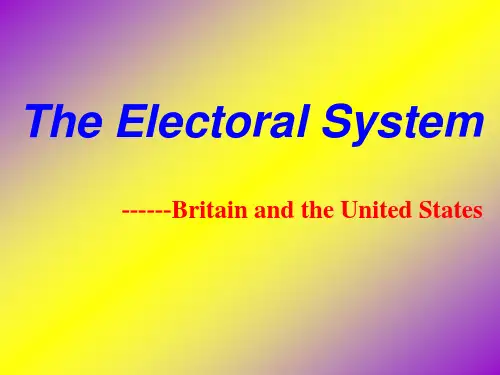

美利坚大选会的流程美利坚大选的流程可真是个有趣又复杂的事儿呢!一、初选阶段。
这就像是一场大型选秀的海选。
各个政党内部先开始竞争,想参加总统竞选的人都要在这个阶段表现自己。
在这个时候啊,不同的州有不同的方式来选出他们支持的候选人。
有的州是通过党团会议,这就像是一场热闹的社区聚会。
选民们聚在一起,讨论来讨论去,最后选出他们觉得最适合代表本党去竞选总统的人。
还有些州呢,是直接进行初选投票,就像我们平时投票选班长那样,只不过规模大得太多太多啦。
在这个过程中,候选人得拼命地拉票,到处演讲,告诉选民自己的想法、政策主张之类的。
比如说,承诺要让经济更好啦,改善医疗啦,或者是加强国防之类的。
他们得把自己的魅力展现得淋漓尽致,就像孔雀开屏一样,吸引选民的注意。
二、全国代表大会。
当初选结束后,各政党就会举办全国代表大会。
这可是个超级盛大的派对一样的活动呢。
在这个大会上,政党正式确定自己的总统候选人。
这时候,整个会场都充满了激情。
大家欢呼、呐喊,像是在庆祝一场伟大的胜利。
而且,在这个大会上,还会确定副总统候选人。
这就像是给主角找个得力的助手。
副总统候选人的选择也很重要哦,要能给整个竞选团队加分才行。
大会上还有很多演讲,大家都在为自己的政党和候选人打气加油,那气氛,热得就像着火了一样。
三、竞选活动阶段。
这是整个大选过程中最热闹、最漫长的阶段啦。
两位(或者多位,不过一般是两大政党的两位候选人竞争比较激烈)候选人就开始全国巡回演讲,到处跑。
他们去大城市,也去小乡镇。
就像一个超级推销员一样,把自己的理念和政策计划推销给每一个能见到的选民。
这个时候啊,电视广告、社交媒体上也到处都是他们的身影。
他们会互相攻击,也会拼命宣传自己的好。
电视辩论也是这个阶段的重头戏。
候选人在辩论台上面对面,就像两只斗鸡一样,谁都不想输给对方。
他们得思维敏捷,回答问题要快又好,还要找机会攻击对手的弱点。
在这个过程中,选民们也在不断地观察、思考,决定到底要把自己的票投给谁。
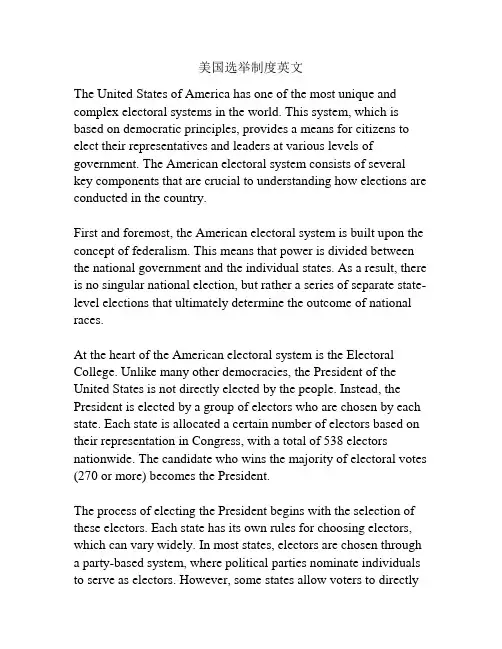
美国选举制度英文The United States of America has one of the most unique and complex electoral systems in the world. This system, which is based on democratic principles, provides a means for citizens to elect their representatives and leaders at various levels of government. The American electoral system consists of several key components that are crucial to understanding how elections are conducted in the country.First and foremost, the American electoral system is built upon the concept of federalism. This means that power is divided between the national government and the individual states. As a result, there is no singular national election, but rather a series of separate state-level elections that ultimately determine the outcome of national races.At the heart of the American electoral system is the Electoral College. Unlike many other democracies, the President of the United States is not directly elected by the people. Instead, the President is elected by a group of electors who are chosen by each state. Each state is allocated a certain number of electors based on their representation in Congress, with a total of 538 electors nationwide. The candidate who wins the majority of electoral votes (270 or more) becomes the President.The process of electing the President begins with the selection of these electors. Each state has its own rules for choosing electors, which can vary widely. In most states, electors are chosen through a party-based system, where political parties nominate individuals to serve as electors. However, some states allow voters to directlyelect electors. Once chosen, these electors are expected to cast their vote in accordance with the popular vote in their respective states.In addition to the Electoral College, the American electoral system also includes several other important aspects. One key feature is the two-party system, which has dominated American politics for much of its history. The two major parties, the Democrats and Republicans, play a significant role in the electoral process, fielding candidates for various offices and shaping the political discourse.Another crucial component of the American electoral system is campaign finance. Elections in the United States are largely funded by private donations, rather than government funding. This has led to concerns about the influence of wealthy donors and interest groups on the electoral process. In recent years, there have been ongoing debates about campaign finance reform and efforts to limit the influence of money in politics.The American electoral system also includes various safeguards to ensure the integrity of the process. This includes measures such as voter registration requirements, voter identification laws, and the use of electronic voting systems. Additionally, the Federal Election Commission oversees the enforcement of campaign finance laws and regulations.Despite its complexities and occasional controversies, the American electoral system is regarded as a cornerstone of democracy. It provides citizens with the opportunity to have their voices heard, elect their leaders, and shape the future of the nation.While there may be ongoing debates about aspects of the system, the United States remains committed to the principles of democracy and the importance of free and fair elections.。
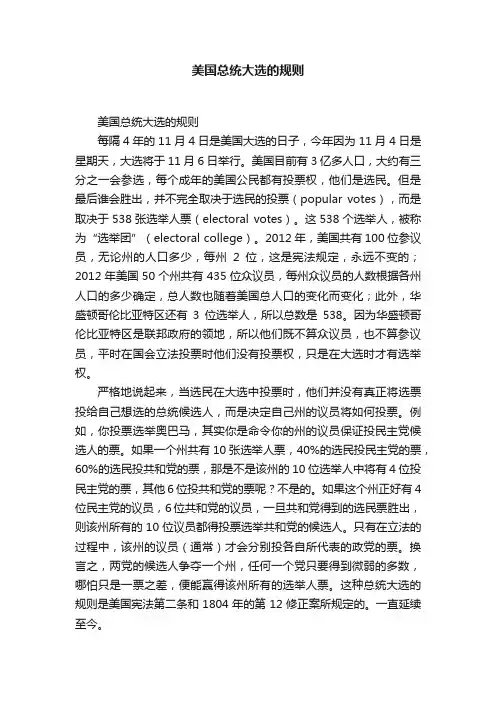
美国总统大选的规则美国总统大选的规则每隔4年的11月4日是美国大选的日子,今年因为11月4日是星期天,大选将于11月6日举行。
美国目前有3亿多人口,大约有三分之一会参选,每个成年的美国公民都有投票权,他们是选民。
但是最后谁会胜出,并不完全取决于选民的投票(popular votes),而是取决于538张选举人票(electoral votes)。
这538个选举人,被称为“选举团”(electoral college)。
2012年,美国共有100位参议员,无论州的人口多少,每州2位,这是宪法规定,永远不变的;2012年美国50个州共有435位众议员,每州众议员的人数根据各州人口的多少确定,总人数也随着美国总人口的变化而变化;此外,华盛顿哥伦比亚特区还有3位选举人,所以总数是538。
因为华盛顿哥伦比亚特区是联邦政府的领地,所以他们既不算众议员,也不算参议员,平时在国会立法投票时他们没有投票权,只是在大选时才有选举权。
严格地说起来,当选民在大选中投票时,他们并没有真正将选票投给自己想选的总统候选人,而是决定自己州的议员将如何投票。
例如,你投票选举奥巴马,其实你是命令你的州的议员保证投民主党候选人的票。
如果一个州共有10张选举人票,40%的选民投民主党的票,60%的选民投共和党的票,那是不是该州的10位选举人中将有4位投民主党的票,其他6位投共和党的票呢?不是的。
如果这个州正好有4位民主党的议员,6位共和党的议员,一旦共和党得到的选民票胜出,则该州所有的10位议员都得投票选举共和党的候选人。
只有在立法的过程中,该州的议员(通常)才会分别投各自所代表的政党的票。
换言之,两党的候选人争夺一个州,任何一个党只要得到微弱的多数,哪怕只是一票之差,便能赢得该州所有的选举人票。
这种总统大选的规则是美国宪法第二条和1804年的第12修正案所规定的。
一直延续至今。
目前美国共有538张选举人票,美国宪法规定总统必须多数当选,换言之,无论奥巴马还是罗姆尼,都必须得到270张选举人票才能当选。
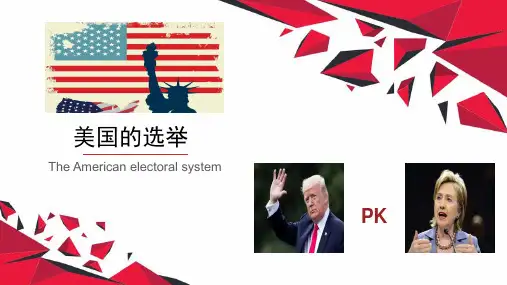
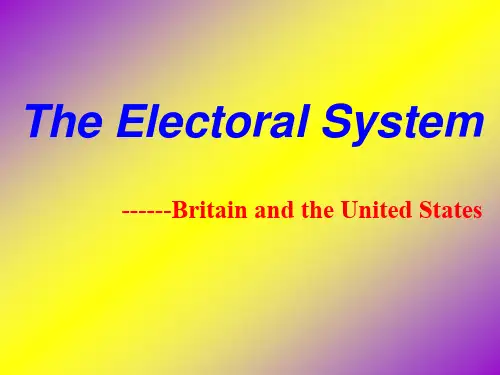
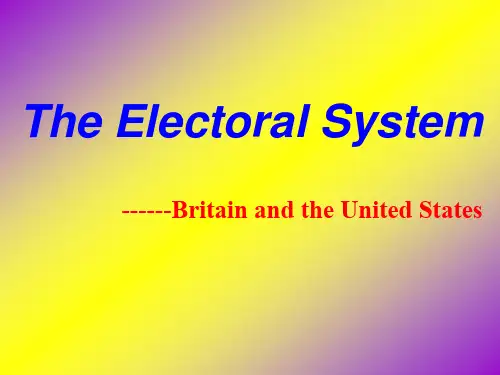
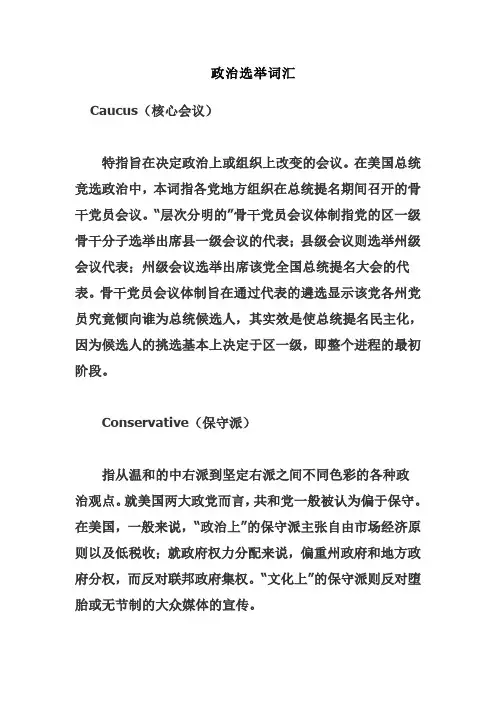
政治选举词汇Caucus(核心会议)特指旨在决定政治上或组织上改变的会议。
在美国总统竞选政治中,本词指各党地方组织在总统提名期间召开的骨干党员会议。
“层次分明的”骨干党员会议体制指党的区一级骨干分子选举出席县一级会议的代表;县级会议则选举州级会议代表;州级会议选举出席该党全国总统提名大会的代表。
骨干党员会议体制旨在通过代表的遴选显示该党各州党员究竟倾向谁为总统候选人,其实效是使总统提名民主化,因为候选人的挑选基本上决定于区一级,即整个进程的最初阶段。
Conservative(保守派)指从温和的中右派到坚定右派之间不同色彩的各种政治观点。
就美国两大政党而言,共和党一般被认为偏于保守。
在美国,一般来说,“政治上”的保守派主张自由市场经济原则以及低税收;就政府权力分配来说,偏重州政府和地方政府分权,而反对联邦政府集权。
“文化上”的保守派则反对堕胎或无节制的大众媒体的宣传。
Debate(辩论)就一个问题的两个或两个以上矛盾面所进行的辩论。
美国政治中,近年来辩论与电视节目挂钩,即总统或副总统候选人在电视上亮相,阐述本人及该党的观点,回答媒体或观众提出的问题。
辩论可以通过广播,也可在社区群众大会上进行。
各级政府公职人员的选举均可进行辩论。
Divided government(分治的政府)一般指总统属于一个政党,而国会的参众两院至少有一院由反对党控制的政治局面。
此种情况也可能发生在州一级,即州长属于一个党,而另一党控制州议会。
在美国政府制度中,常出现两党分治。
其历史影响则是减少急剧改革,促使两党政治家在立法提案上进行妥协。
Federal Election Campaign Act(FECA)(联邦竞选法)这项1971年制定的法律规定了联邦选举的财务事项,曾于1974、1976及1979三度修订。
该法要求候选人及政治委员会公开资金来源及开支情况,同时规定联邦大选期间接受捐款及开支款项事宜。
该法并对用公共资金资助总统竞选作出了规定。
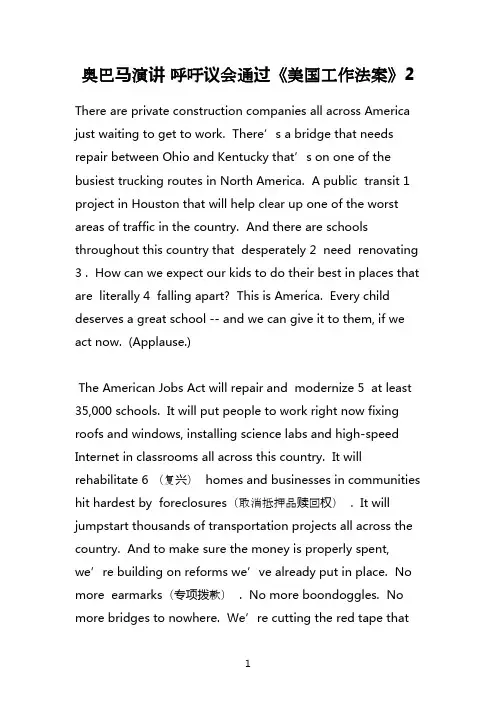
奥巴马演讲呼吁议会通过《美国工作法案》2There are private construction companies all across America just waiting to get to work. There’s a bridge that needs repair between Ohio and Kentucky that’s on one of the busiest trucking routes in North America. A public transit 1 project in Houston that will help clear up one of the worst areas of traffic in the country. And there are schools throughout this country that desperately 2 need renovating 3 . How can we expect our kids to do their best in places that are literally 4 falling apart? This is America. Every child deserves a great school -- and we can give it to them, if we act now. (Applause.)The American Jobs Act will repair and modernize 5 at least 35,000 schools. It will put people to work right now fixing roofs and windows, installing science labs and high-speed Internet in classrooms all across this country. It will rehabilitate 6 (复兴) homes and businesses in communities hit hardest by foreclosures(取消抵押品赎回权) . It will jumpstart thousands of transportation projects all across the country. And to make sure the money is properly spent, we’re building on reforms we’ve already put in place. No more earmarks(专项拨款) . No more boondoggles. No more bridges to nowhere. We’re cutting the red tape tha tprevents some of these projects from getting started as quickly as possible. And we’ll set up an independent fund to attract private dollars and issue loans based on two criteria: how badly a construction project is needed and how much good it will do for the economy. (Applause.)This idea came from a bill written by a Texas Republican and a Massachusetts Democrat 7 . The idea for a big boost in construction is supported by America’s largest business organization and America’s largest labor 8 organization. It’s the kind of proposal that’s been supported in the past by Democrats 9 and Republicans alike. You should pass it right away. (Applause.)Pass this jobs bill, and thousands of teachers in every state will go back to work. These are the men and women charged with preparing our children for a world where the competition has never been tougher. But while they’re adding teachers in places like South Korea, we’re laying them off in droves. It’s unfair to our kids. It undermines their future and ours. And it has to stop. Pass this bill, and put our teachers back in the classroom where they belong. (Applause.)Pass this jobs bill, and companies will get extra tax credits ifthey hire America’s veterans. We ask these men and women to leave their careers, leave their families, risk their lives to fight for our country. The last thing they should have to do is fight for a job when they come home. (Applause.)Pass this bill, and hundreds of thousands of disadvantaged young people will have the hope and the dignity of a summer job next year. And their parents -- (applause) -- their parents, low-income Americans who desperately want to work, will have more ladders out of poverty.Pass this jobs bill, and companies will get a $4,000 tax credit if they hire anyone who has spent more than six months looking for a job. (Applause.) We have to do more to help the long-term unemployed 10 in their search for work. This jobs plan builds on a program in Georgia that several Republican leaders have highlighted, where people who collect unemployment insurance participate in temporary work as a way to build their skills while they look for a permanent job. The plan also extends unemployment insurance for another year. (Applause.) If the millions of unemployed Americans stopped getting this insurance, and stopped using that money for basic necessities, it would be a devastating 11 blow to this economy. Democrats and Republicans in this chamber 12 have supportedunemployment insurance plenty of times in the past. And in this time of prolonged hardship, you should pass it again -- right away. (Applause.)Pass this jobs bill, and the typical working family will get a $1,500 tax cut next year. Fifteen hundred dollars that would have been taken out of your pocket will go into your pocket. This expands on the tax cut that Democrats and Republicans already passed for this year. If we allow that tax cut to expire -- if we refuse to act -- middle-class families will get hit with a tax increase at the worst possible time. We can’t let that happen. I know that some of you have sworn oaths to never raise any taxes on anyone for as long as you live. Now is not the time to carve out an exception and raise middle-class taxes, which is why you should pass this bill right away. (Applause.)This is the American Jobs Act. It will lead to new jobs for construction workers, for teachers, for veterans, for first responders, young people and the long-term unemployed. It will provide tax credits to companies that hire new workers, tax relief to small business owners, and tax cuts for the middle class. And here’s the other thing I want the American people to know: The American Jobs Act will not add to the deficit 13 . It will be paid for. And here’show. (Applause.)The agreement we passed in July will cut government spending by about $1 trillion over the next 10 years. It also charges this Congress to come up with an additional $1.5 trillion in savings 14 by Christmas. Tonight, I am asking you to increase that amount so that it covers the full cost of the American Jobs Act. And a week from Monday, I’ll be releasing a more ambitious deficit plan -- a plan that will not only cover the cost of this jobs bill, but stabilize 15 our debt in the long run. (Applause.)■文章重点单词注释:1transitn.经过,运输;vt.穿越,旋转;vi.越过参考例句:His luggage was lost in transit.他的行李在运送中丢失。


美國總統大選是一段漫長的歷程,必須歷經政黨初選、提名、競選活動、全民投票、選舉人團投票等階段,才能順利入主白宮。
根據美國憲法規定,美國采【總統制】,行政權屬于總統。
總統大選每四年進行一次,並可連任一次。
【總統兼任三軍統帥,同時不需向國會負責。
】■ 總統候選人資格依據美國憲法,競選總統的候選人必須符合:【在美國本土出生、至少年滿三十五歲、在美國至少已居住十四年以上的條件。
】●選舉制度一、政黨初選大選年的二月至六月間,各政黨在各州進行政黨初選,產生出席全國代表大會的政黨代表。
★選舉方式有二::第一種為「直接初選」,透過選民投票方式直接產生黨代表。
第二種為「黨團會議」,由基層(如郡)而上的各級會議推選各級代表,最後在州代表會議中推選出席全國代表大會的政黨代表。
★目前多數州採取直接初選方式,其中新罕布什爾州為最早進行直接初選的一州。
【愛阿華州】則是全美第一個進行黨團會議的州。
此兩州的初選結果,將會影響其後各州的選舉結果,被視為大選風向球。
二、政黨全國代表大會/政黨提名兩黨通常在七、八月份各自舉行全國代表大會,由各州選出參加全國代表大會的黨代表,將在此推選本党的總統、副總統候選人,聽取各委員會報告,同時制定黨綱。
在五、六月間,全國代表大會的大部份成員已經產生,各總統候選人擁有多少代表支持也已明朗化,誰將贏得政黨最後提名大致上已經底定。
因此,★全國代表大會實際上只是認可總統、副總統候選人提名的最後一道程式而已。
總統候選人的提名,通常在大會的第三天或第四天進行。
三、競選造勢九月至十一月間,各政黨推出的總統、副總統候選人,隨即展開全美的競選造勢活動,上山下海和選民會面,同時也有在電視上發表演說,進行電視辯論等等,競選造勢期間長達八至九周,耗費相當可觀。
四、投票總統大選的投票分為兩個進程,一為全民投票,二為選舉人團投票。
【全民投票】:大選年十一月份第一周之後的第一個星期二,明定為投票日。
這一天的全民投票,實際上並非選舉總統,而是選舉出代表選民的「選舉人團」。
美国众议长选举规则美国众议长选举是在美国宪法设定的职权之下,由每一州的选民(投票)来选定美国众议院的议员,这是美国职权形态的表达:选民代表———美国众议院(每两届国会面临选举)。
美国众议院议员将由每州中半数以上的选民成功选举出来,而每一州所能选出的议员数量,是根据该州的总人口来计算的:每一州都至少被分配了一个议员的议席。
全美国现在有435个议员的议席,其中5个州 - 佛罗里达、华盛顿特区、爱荷华、伊利诺伊和内华达 - 是只有一位议员。
美国联邦宪法确定美国参议院在美国一般选举(包括众议长选举)期间的特殊权力:它授权美国参议院在全国性选举(VA)中“不等于全国总统或联邦下属法定投票数”的候选人能够获得支持(当然,如果在某一届国会选举中,某个候选人在全国范围内获得了清晰的胜利,则他或她也可以在各州国会选举中被选举为议员)。
美国众议长将继续激励在任何美国竞选中都要展现能力和价值,以及为联邦政府和各个州政府提供决策并利用它们的资源。
获选为美国众议院议员的所有者,将有权参与联邦财务政策的制定(包括税收),负责美国上诉法院聘用和确认,以及美国联邦部门政策的审查。
众议院议员从其任期中获得薪酬由宪法确定,并接受美国选民反馈、地方选民反馈和国会建议或要求。
美国众议院议员选举活动也受美国联邦选举法案(FECA)的管理。
FECA是美国联邦政府(美国最高法院)制定的联邦立法,旨在确保公平、公共的、好的选举程序。
FECA要求全国竞选者从各自的政党接受钱款,并且严格控制竞选活动期间所收集的款项和支出,以留下透明、公开的有关托拉斯法案和竞选活动的记录,以及候选人的公约。
除此之外,FECA还要求竞选组织在竞选活动的任何阶段和组织披露任何因为他们横向支出的财务资料。
此外,竞选活动期间,候选人必须遵守法律,在美国众议院议员的选举活动中,包括违反选票的贩卖行为,采取非法就职措施,以及要求选民投他们愿意为候选人表决的法律。
为了确保公正,每一个竞选活动期间和投票日也都有美国司法部(美国司法部)派出的联邦调查局(FBI)代表派驻现场,因此对任何违法者都将展开调查和处理,以确保选举活动的公正性和完整性。